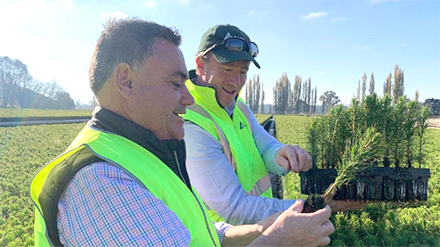NSW farmers and private native forestry operations will be exempt from the controversial koala planning policy that nearly blew up the Coalition government agreement last month. A crucial cabinet meeting on Tuesday confirmed changes to the divisive state environmental planning policy more than three weeks after Deputy Premier and Nationals leader John Barilaro threatened to move his party to the crossbench over the policy. Source: Timbebiz
The new policy separates private forestry and land management into the Local Land Services Act and removes controversial habitat maps in favour of on-ground surveys.
It also re-defines the meaning of “core koala habitat” and enforces the protection of 123 target tree species that have been shown to be crucial sources of habitat and feed for koalas.
But some sections of the resulting policy are unchanged, including the 123 tree species considered critical to koala habitat, as well as requirements for DA approvals outside day-to-day farming.
The definition of “core koala habitat” has been refined to mean it must be highly suitable habitat with koalas present and with a confirmed record of koalas, or highly suitable with a record of koalas in the past 18 years.
It now means that if a farmer sees a koala up a power pole, the area would not be considered high quality koala habitat.
The NSW government signed off on less a month after it almost tore the state Coalition apart.
NSW Nationals leader and Deputy Premier John Barilaro had threatened to dissolve the Coalition government if concessions weren’t made to rural property owners.
Mr Barilaro argued the laws were a “nail in the coffin for farmers” and threatened to take his MPs to the crossbench. He but backed down less than 24 hours later after an ultimatum from Premier Gladys Berejiklian.
On Tuesday night, state cabinet finally agreed on an amended set of rules to the State Environmental Planning Policy covering koala habitat.
Acting Nationals leader and acting Deputy Premier Paul Toole conceded the policy had been controversial but said the right balance had been found so farmers weren’t weighed down by ‘green tape’.
“This was a matter that was worth fighting for,” Mr Toole said. “It had been very contentious over the past couple of months, but it was something that was important to our farmers right across regional NSW and that’s why the Nationals stood up for them.
“We’ve had a lot of robust discussions but what’s important here is that we’ve come up with a balanced outcome – one that’s going to protect farmers’ practices but also allow the koala population to thrive.”
The new policy separates private forestry and land management into the Local Land Services Act and removes controversial habitat maps in favour of on-ground surveys.
It also re-defines the meaning of “core koala habitat” and enforces the protection of 123 target tree species that have been shown to be crucial sources of habitat and feed for koalas.
Planning Minister Rob Stokes said the heated debate over the policy resulted in a better outcome for all.
“We always have robust conversations when it comes to issues that deal with controls over private land,” he said. “But we achieved a landing as we always do.”
Ms Berejiklian issued an ultimatum to the Nationals when they threatened to break with the Liberals over the policy.
She told Mr Barilaro that Nationals MPs had no option but to support the government or relinquish their ministerial portfolios and move to the crossbench.
In the end, Mr Barilaro folded and agreed to remain in the Coalition in return for renewed discussions on the koala policy.
Mr Stokes said the new agreement recognised the role farmers played in protecting koalas, while also preserving crucial habitat.
“This policy was in no way seeking to victimise farmers who are doing the right thing,” he said.
“It is particularly aimed at urban expansion on the north coast of NSW or in areas around Sydney, where there is significant land clearing of core koala habitat.
“Obviously that has to stop and that’s what this policy achieves.”
Amendments to the Local Land Services Act will need to pass Parliament before the final policy can take full effect. The state government hopes to introduce them by the end of 2020.






